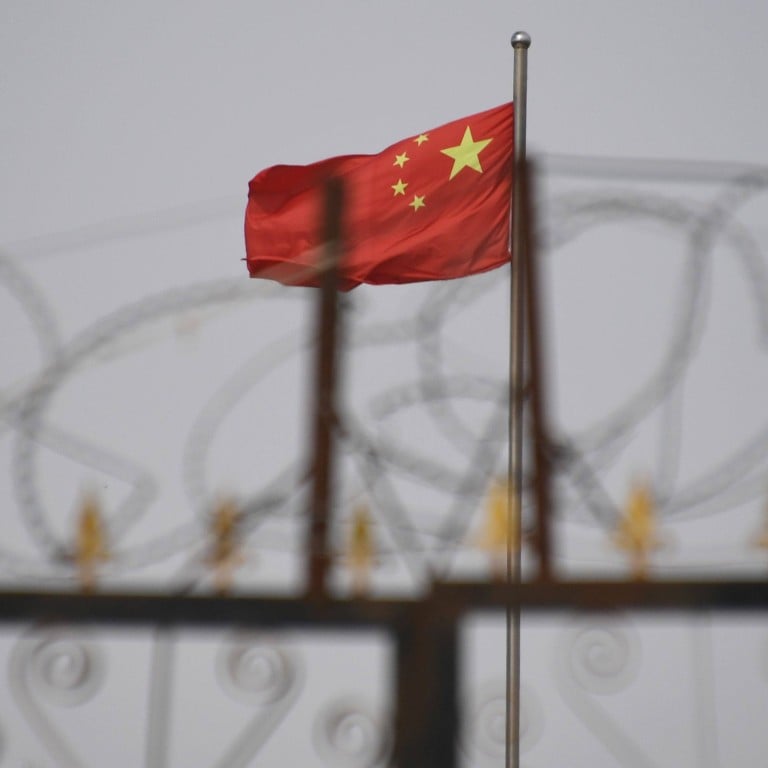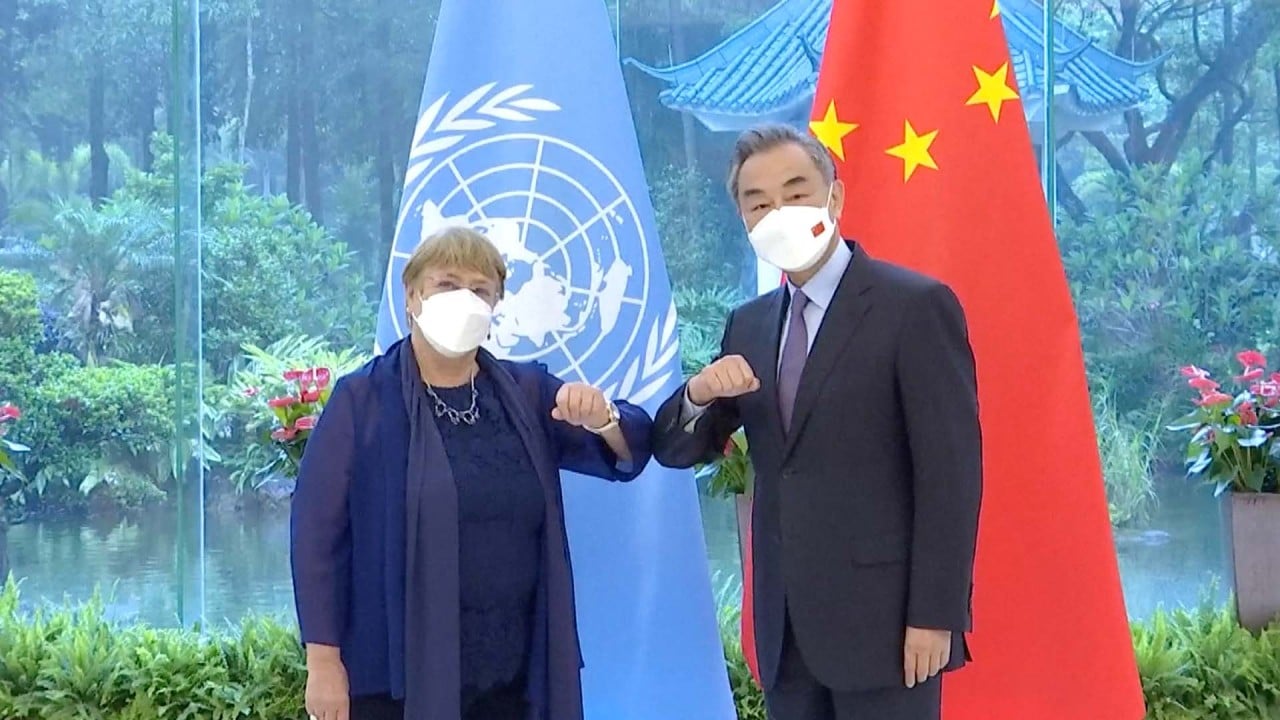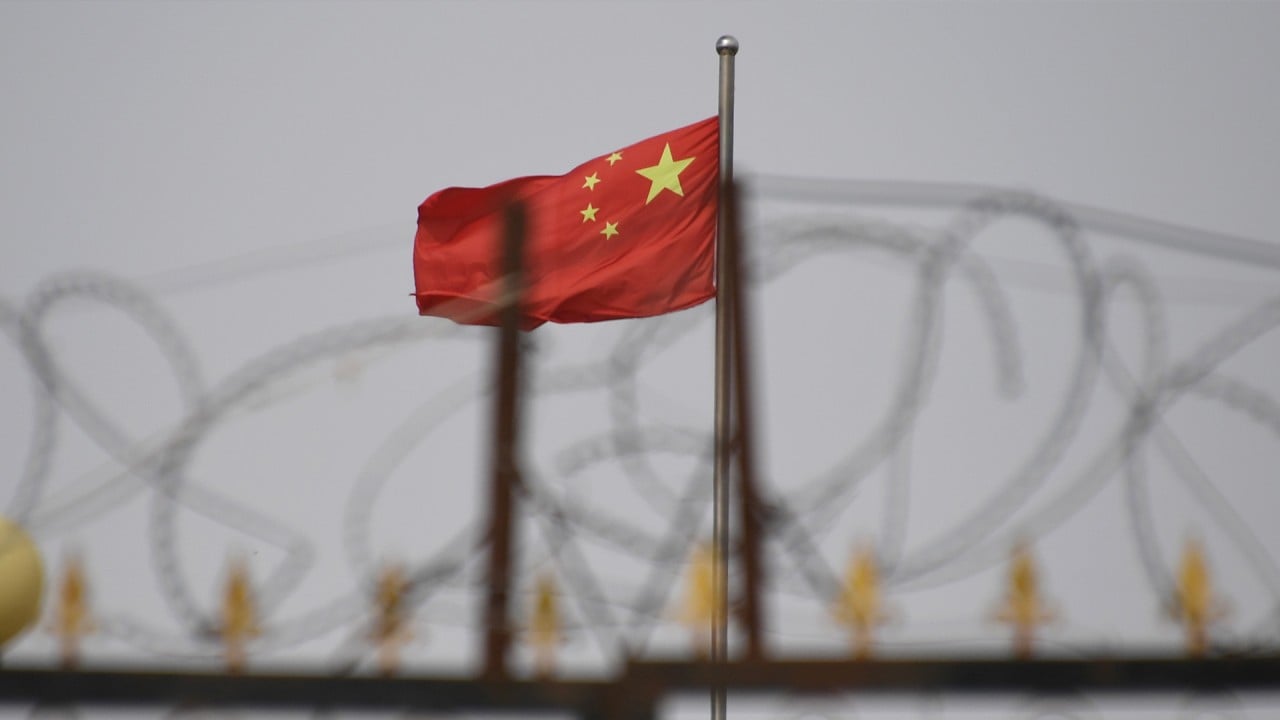
EU laments UN human rights chief’s limited access on visit to China
- The EU’s foreign affairs spokeswoman expresses ‘regret’ that Michelle Bachelet was not given full access to Xinjiang detention camps
- Beijing has hailed the visit as a great success, but Brussels remains sceptical of the wisdom of the visit
“While taking note of the non-investigative nature of the visit, we regret that the high commissioner’s access to independent civil society organisations, human rights defenders and detention centres was limited, and that this did not allow her to assess the full scale of political re-education camps in Xinjiang,” Massrali said.
“In this spirit, the EU encourages the Office of the UN High Commissioner for Human Rights to release the already announced, remote-monitoring report on the human rights situation in Xinjiang as a matter of priority.”
UN human rights commissioner lands in China for trip to Xinjiang
“Western countries, out of ulterior motives, went to great lengths to disrupt and undercut the high commissioner’s visit, their plot didn’t succeed,” vice-foreign minister Ma Zhaoxu said on Saturday.
The EU will receive a full debrief next week when Bachelet co-chairs a strategic dialogue with her office, the Post has learned.
The Chinese government has been accused of forced sterilisation and mass internment of Uygurs and other Muslim minorities.
Beijing has denied such allegations, saying its internment camps are vocational training centres to tackle radicalisation and terrorism.
Speaking in Guangzhou on Saturday, Bachelet said she visited a prison and one of the centres but was not able to “access the full scale” of these “vocational education and training centres”.
“I raised with the government the lack of independent judicial oversight of the operation of the programme … allegations of the use of force and ill-treatment in institutions, and reports of unduly severe restrictions on legitimate religious practices,” Bachelet said.
She also called on Beijing to review its counterterrorism and anti-radicalisation policies to make sure that they complied with international human rights standards.
“In the Xinjiang Uygur autonomous region, I have raised questions and concerns about the application of counterterrorism and deradicalisation measures and the broad application, particularly the impact on the rights of Uygurs and other predominantly Muslim minorities,” she said.
Bachelet said her trip was not intended as an investigation and she had “unsupervised” access to meetings the UN had arranged for her in Xinjiang. She also described her visit as an opportunity for “candour” in discussions on human rights issues with China’s leaders.
“To those who have sent me appeals, asking me to raise issues or cases with the authorities, I have heard you,” she said. “I will continue to follow up on such issues and instances of concern on a sustained basis.”
US ‘deeply concerned’ about UN rights chief Michelle Bachelet’s China visit
However, it was plagued with controversy and bookended by testy encounters with both diplomats and the media.
On her first day in China, Bachelet held a prickly video call with more than 100 diplomats in China.
According to sources who watched the event, 17 countries made interventions, including Cuba, Pakistan and Iran, each of which praised China’s human rights record.
Another 14 countries urged her to insist upon unfettered access to suspected detention centres in Xinjiang – a stated aim of her office before a trip was agreed.
A defensive Bachelet told the group: “I was not born yesterday, ambassadors … I am an experienced woman.”
Before travelling, Bachelet met a series of groups representing Chinese civil society, exiled activists and human rights campaigners in Switzerland.
According to a person present at one, Bachelet said she “knew how to navigate the politics” of China, when confronted with concerns that she was “being instrumentalised”.
But after watching Saturday’s press conference – held virtually due to Covid-19 restrictions – European diplomats remain unconvinced of the wisdom of her visit.
One pointed out Bachelet’s office in Geneva had been forced to issue a clarifying statement on Wednesday after a state media account of her call with Xi quoted her as saying: “I admire China’s efforts in … protecting human rights, and realising economic and social development.”
In her clarified remarks issued hours later, Bachelet did not praise China’s efforts to “protect human rights”.
“This is what the government does with each and every visit. They put words into others’ mouths,” said one China-based envoy.
Another pointed out that Bachelet had spoken at length about US gun violence when asked by Chinese state media, while giving only “curt” remarks to international media’s questions about human rights conditions in China.
It was suggested that Bachelet had erred in asking Xinjiang authorities to review their own policies, which was akin to “asking the wolf to take care of the sheep”.
It comes amid mounting pressure from European governments for their companies to extricate themselves from Xinjiang, due to human rights concerns.
China-US divide over UN human rights chief’s visit to Xinjiang
Campaigners accused Bachelet of ignoring her own office’s work, adopting the Chinese government’s language and “missing a unique opportunity to lay the groundwork for a substantial monitoring of China’s human rights crisis”.
“Her speech evidenced her lack of understanding of the country’s human rights challenges despite significant evidence gathered by her office,” said Raphael Viana David, acting Asia programme manager at the International Service for Human Rights.
“Her statement lists broad concerns in a remarkably light language. She stated being ‘unable to assess the full scale’ of internment camps – for which she uses the government’s term of ‘vocational and education training centre’ – and relayed Beijing’s assertion that this system was ‘dismantled’ without stating whether she was given any evidence of it.”



